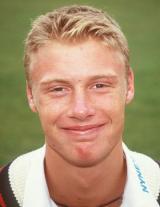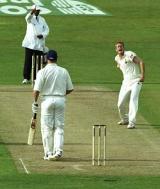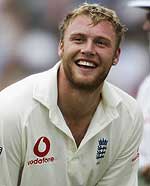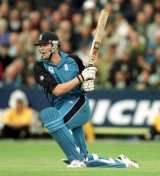From little icons
. . . do great oaks grow. Colin Shindler goes back to the roots of Andrew Flintoff's career and traces his rise to superstar beside that of a fellow Lancashire schoolboy
|
|

|
Even more surprisingly he dropped an estimated five or six catches, although Lancashire still defeated Hampshire comfortably enough and continued their southern tour with a trip to The Oval, where, the next day, they gave a debut to Richard Green, the young swing bowler. Green made a more auspicious start, bowling the Surrey captain Adam Hollioake and the wicketkeeper Neil Sargeant in the first innings before dismissing Graham Thorpe in the same manner in the second. David Lloyd, the Lancashire coach, thought Green's ability to swing the ball away from the right-handers was reminiscent of Robin Jackman.
At the start of the following season both youngsters were in the first team for the curtain-raiser, a first-class friendly against Yorkshire. Between the April showers Flintoff, batting at No. 5, made 2 before being caught off Darren Gough and was not asked to bowl. Richard Green took six wickets for 41 in 17 outstanding overs. Two years later, when Flintoff made his Test debut against South Africa, Green was back in the Lancashire 2nd XI. When Andrew Flintoff became the nation's darling after his consistently brilliant performances in the 2005 Ashes, Richard Green was running a firm that refurbishes properties. Funny old game, cricket.
Flintoff was ever a slow starter. He also made a modest Test debut at Trent Bridge and in the next game at Headingley looked miserably out of his depth. His first-innings duck was unfortunate, television replays suggesting his bat had not touched the ball, which rebounded off his pad to short leg. But his bowling was unthreatening and his second-innings duck, caught behind off Allan Donald, suggested the whispers that he had been promoted too early had some foundation.
Lloyd is adamant that the captain Alec Stewart was keen to have Flintoff in his side and John Abrahams, the England Under-19 coach, returned from the winter tour of 1996-97 convinced that two of his side were already good enough for Test cricket - Ben Hollioake and Flintoff. Hollioake made his debut against Australia in the last of the 1997 one-day internationals. It was now Flintoff's turn, even if his performance did not generally convince.
Of course they said the same thing when he made his first appearance for Dutton Forshaw under-14s. He was poorly turned out, he had no cricket whites, he was banished to the boundary when his side fielded and he was out first ball. In mitigation one should perhaps add that he was only six years old at the time. Other six-year-olds in Preston in 1984 with an ambition to play for England (or even the Dutton Forshaw under-14s) who were of a less generous nature, might have observed that Flintoff got picked only because his dad, Colin, was the captain of Dutton Forshaw 2nd XI.
To an extent all stories of the early days of professional sportsmen are similar. They are invariably outstanding at school and are promoted rapidly upwards until they find their natural level in their early 20s. Richard Green, like Flintoff's current agent Neil Fairbrother, came from Warrington and progressed from Grappenhall cricket club, for whom both his father and grandfather had also played, through the junior ranks of Cheshire cricket until he arrived at Old Trafford on a scholarship as a teenager, a batsman who bowled offspin rather than the swing bowler he became. The offspin was quickly jettisoned. "You can't bowl offspin; you're not good enough," said Lloyd, who had also arrived at Old Trafford as a teenage spinner.
Clubs and family seem to be the catalyst for the advancement of cricket's junior talent these days. The days of the dedicated school teacher, who would infuse in his pupils his own love of the game, organise net practice and umpire after school and on weekends, are long gone, at least in the state sector. Indeed, schools do not seem to feature at all in the nurturing of these two cricketing talents.
It was Grappenhall cricket club rather than Bridgewater High School or Mid-Cheshire College which advanced Green's claims to become a professional cricketer. Neither of Flintoff's two schools in Preston - Greenlands County Primary School and Ribbleton Hall High School - played much organised cricket and it was Colin Flintoff who fortuitously saw an advert on the back of the Lancashire CCC handbook which informed him of the existence of a Lancashire Schools Under-11 side. Theoretically, a candidate's school had to be affiliated but the team manager, fortunately, was not hidebound by bureaucracy and encouraged Colin to bring the nine-year-old Andrew to trials. Adam Gilchrist must be cursing that advert.
|
|

|
Harris Park could contain the ebullient younger Flintoff only until he was 13 when he made the short journey to join St Anne's cricket club. St Anne's is Blackpool's genteel elderly aunt, a middle-class enclave cheek-by-jowl with the exuberant seaside resort that, according to the famous monologue, is "noted for fresh air and fun". Andrew Flintoff soon caused more damage than young Albert Ramsbottom when he poked his stick with the horse's head handle into the ear of Wallace, the lion. The new executive houses built on what had previously been the cricket club's 3rd XI ground were now within range of a lofted Flintoff straight drive or pull. The brochures which had attracted their purchasers had made no mention of the real and present dangers of windows being regularly smashed by a teenage prodigy. Nearly every grown-up schoolboy who loves the game can recall playing an innings which won a junior match. Sometimes the innings might reach the much coveted fifty mark. Few can have scored 232 out of 319 for no wicket declared, as Flintoff once did.
Impressive performances in Lancashire representative games brought him to the county's attention. On the day that the Lancashire coach came to see if he was as outstanding as all his scouts had told him, Flintoff failed but the visit had been window dressing. A contract was always going to be offered. "It wasn't rocket science," observes Lloyd mildly. "His performances were there for all to see."
Not everyone at the club shared the coach's unbridled enthusiasm for the gawky young lad from Preston. It soon became clear that, although he was capable of murdering bowlers for a dozen overs, he never spent long enough at the crease to learn to build an innings. It was a failing that dogged him almost until the summer of 2003 when he started showing more than occasional signs that he could be a very good player. Too often in the past he would hit two or three big boundaries and then hole out. His shot selection was naive.
Mike Atherton, captain of England at the time and something of a schoolboy wunderkind himself, would watch him in the nets and not allow himself to be too impressed. He could see that Flintoff was good enough to bully other players in his age group despite his build (he was as thin as a rake at 16). However, if he was going to be as good as Lloyd and others were speculating, it would not become apparent for a few more years. The development of his bowling and the reliability of his catching (after the disaster at Hampshire) meant that he could still contribute to the team while his batting matured. His build began to change when he discovered the delights of Guinness, a shock to the system of a boy who had been strictly teetotal until then.
Richard Green already knew how to have a good time in Manchester but at the age of 20 he seemed to be progressing well despite the late nights. In 1996, as Flintoff languished in the seconds, Green played in six County Championship matches and took 16 wickets at 34. He would have taken more but the Lancashire attack was a strong one - Martin, Chapple, Austin and Wasim Akram were the regular seamers and, when Wasim toured with Pakistan, Lancashire hired the South African Steve Elworthy to take his place. Elworthy was not considered a success, and was dropped from the Lancashire side that won both Lord's finals in 1996, but Green felt Lancashire did not trust him enough to give him the extended run in the side he craved.
|
|

|
Green admits that he made things difficult for himself by showing up late to the first net practice of Whatmore's regime after a heavy night out. However, he felt that Whatmore categorised him immediately as someone who was unlikely to feature regularly in the side and he was effectively ignored, although Wasim and Ian Austin in particular were consistently helpful and encouraging.
Flintoff, too, was finding progress difficult. He had moved away from his strong, supportive family in Preston and was living a very different life as a professional cricketer in Manchester. Both John Stanworth, his 2nd XI coach (who gave him the nickname Fred), and Lloyd admit honestly that as a club Lancashire did not help young Andrew as they should have done. He had money in his pocket and he could eat and drink whatever he liked. His choices were as inappropriate as his shot selection.
There was never any doubt about his innate ability, of course, and one over in 1998 guaranteed him a regular first-team berth and his Test debut. Almost half the Championship match against Surrey at Old Trafford was lost to rain and on the final afternoon Lancashire were set 250 in 53 overs. Alex Tudor, an England Under-19 colleague, had removed Flintoff caught behind for nought in the first innings. Flintoff took his revenge in spectacular fashion, hitting Tudor for 6,4,4,4,4,6,6 off the first seven balls of an over that contained two no-balls. The last extra delivery was a dot ball and Flintoff missed the chance to beat the famous Garry Sobers record.
Later that summer, the day before Flintoff was due to meet up with the England team Atherton took him into the captain's room at Old Trafford, sat him down and told him what to expect: apart from the media intrusion and a dressing room full of hard-bitten sceptics there would be coaches whose job it was to "improve" international players. He warned him to ignore all such advice and do what he had been doing naturally. The first thing Atherton saw on wandering into the nets at Trent Bridge was Graham Gooch trying to alter Flintoff's stance and backlift.
|
|

|
In 1999 he played nine matches and took 18 wickets at an average of 35. His best performance was in the Roses match at Old Trafford when he took four wickets in eight balls to help dismiss Yorkshire for 67 but, with Yorkshire on the ropes, Crawley threw the ball to Peter Martin to finish off the innings. Lancashire were soon reduced to 22 for 3, which was when Flintoff changed the course of the match, scoring a thunderous 160 off 162 balls. He had returned to county cricket after a disappointing World Cup but that innings confirmed the belief in those of us who saw it that he was destined for stardom.
Poor Richard Green seemed destined for the osteopath. Lower-back problems and mental anxieties were significantly affecting him and by now he was no longer a promising teenager. Fred, too, had been having back problems which restricted his ability to bowl and therefore his effectiveness as an allrounder. By 2000 he had been recalled to the Test side but was dropped after the first Test which was lost to West Indies. The pin-thin Preston teenager was expanding in all the wrong areas.
The popular press which had been primed to proclaim his heroic status now turned on him. The England management thought Flintoff could be shocked into becoming a great player by releasing details of his weight problems. When he won the Man-of-the-Match award in a one-day international at Old Trafford, he shrugged off the congratulations with a rueful, perhaps bitter aside: "All right for a fat lad." Thirteen days later he won a NatWest Trophy quarter-final against Surrey, scoring 135 not out, an innings David Gower described as "one of the most awesome we are ever going to see on a cricket field". Yet the following year, when the Australians toured, Flintoff was back playing county cricket, averaging 26 with the bat and 37 with the ball. The curse of inconsistency still lay heavily on him.
|
|

|
Atherton is convinced it was the back injury that finished Green's career as a professional bowler, a conviction sprung no doubt from his own series of debilitating back problems. Green himself will admit to a mental fragility and Stanworth thinks Richard was always a "nervy" player. The arm round the shoulder he received from Peter Sleep and Ian Austin was greatly appreciated just as the perceived lack of confidence from his first-team captain was psychologically damaging.
Flintoff's talent and self-belief were so huge that, despite the frustrating inconsistency, the lack of wickets, the poor shot selection and the consequently unimpressive averages with both ball and bat, neither Lancashire nor England ever lost that initial belief that he would eventually succeed. Fletcher has shown with Ashley Giles and Geraint Jones that he will trust his original judgement even if results and critical abuse would cause lesser men to reconsider. Flintoff's national celebrity status owes much to this unflinching conviction.
The tour of India in 2001-02 was the turning point for Flintoff, the topless celebration of a last-over victory in Mumbai the enduring image. As England started to win consistently Flintoff's star rose accordingly. Opening the batting, Richard Green ended the 2005 season with 930 runs, captaining Grappenhall to sixth place in the Cheshire County League second division. Andrew Flintoff ended 2005 season with his likeness immortalised on a postage stamp.
Colin Shindler is the best-selling author of Manchester United Ruined My Life in which he recalls his first visit to Old Trafford to watch the Test match against South Africa in 1955
